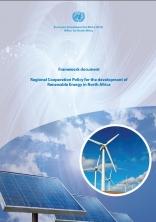Regional Cooperation Policy for the development of Renewable Energy in North Africa

The North African countries have not yet taken full advantage of the cooperation opportunities in the region, nor in terms of market development (intra-regional trade represents less than 4% of their total trade) nor in terms of promoting new economic
opportunities contributing to sustainable growth and job creation. The economic cost of this lack of integration has been estimated at about 2-3 percent of GDP.
The energy sector could play a key role in the region’s socio-economic development and be a driver of regional integration, given on the one hand, the importance of solar energy resources (oil, solar and wind depending on the country) and on the other hand the countries’ strong dependence on energy trade: some to balance their energy budgets, others because their energy exports often constitute the bulk of the wealth created.
Energy policies implemented in the countries of North Africa reflect individual strategies that take little account of the choices made by neighboring countries, despite the proximity of their markets, complementarities that may exist as well as the opportunities for economies of scale.
The challenges (increasing demand for energy, sustainable development, low competitiveness, reducing environmental impacts) and the opportunities (value added, job creation, transfer of knowledge and technology acquisition) that North African countries are experiencing today in this field, call for collective action across the whole region, oriented towards tangible results.
The implementation of the energy transition offers an opportunity to establish new regional industrial sectors (wind, PV, CSP, energy efficiency) creating jobs. The need for the significant investments required to develop these sectors coupled with the need to organize the associated technology transfers, offer many opportunities to build truly innovative publicprivate partnerships.
The region could further strengthen its position as an actor, forming the Euro-Mediterranean energy transition, and also its collaboration with other regions on the continent, especially the Western region. In this context, regional cooperation is expected to be built gradually, based on a long-term vision and common strategic areas through (i) a strengthening of the dialogue, information and knowledge exchange, (ii) harmonization of policies and regulatory frameworks and (ii) the implementation of joint projects.
This publication examines issues related to energy transition in North Africa, the way it is understood by the countries, their progress and major challenges faced, in promoting the development of renewable energies. It focuses on key opportunities for cooperation in four key areas: funding, the development of a regional market, industrial integration and skills development.
The report provides the conceptual basis for a common policy and guidelines for defining a roadmap and a steering mechanism, facilitating implementation.
This publication is the result of a highly participatory process that relied on technical consultations in the context of an enlarged experts’ meeting and a peer review process, to which several partners took part, including UMA, LAS, ESCWA, RCREEE and IRENA. Thanks to all of them.
Finally, it is essential to emphasize the importance and centrality of an effective commitment of the countries and actors in the renewable energy sector, in the implementation of a shared vision and a program of action that combine public and private
initiatives, forging regional partnerships that will benefit the welfare of all citizens of the region.